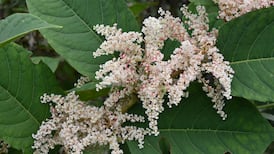Q: A honeysuckle and an elder tree in the garden have been ravaged by aphids. I was hoping natural predators might have a feast but there’s no let up so far. Is it a seasonal occurrence due to spring weather conditions or should I get pruning? JMcK, Co Dublin
Also commonly known as greenfly and blackfly, aphids can be found in most Irish gardens at some stage during the growing season. These sap-sucking insects like to feed from the juicy sap of plants, often quickly forming large colonies along affected branches and leaf tips, which they then cover with their sticky excretion known as honeydew.
Rather than referring to a specific species, the word “aphid” is an umbrella term, that refers to a wide variety of different species, some of which are quite specific in terms of the species of plant that they feed on (for example, the woolly beach aphid, which feeds on the leaves of beech trees and hedges) while others are less discriminating. Some species of plants are also more susceptible to attack than others. Unfortunately, honeysuckle (Lonicera) and elder (Sambucus) are among the former.
[ Your gardening questions answered: What is my mystery plant?Opens in new window ]
Although they’re part of the natural ecosystem of a garden and are often naturally kept in control by predators such as ladybirds, hoverflies, earwigs and parasitoid wasps, sustained infestations, like those seen on your honeysuckle and elder tree, can eventually weaken afflicted plants and cause distortion and damage to the leaves and flowers. Aphids are also sometimes a vector for destructive plant viruses, which they pass on by feeding on plant tissue.
RM Block
My suggestion is to take a multipronged approach to their control. Aphids overwinter as eggs on the affected plants, so start by cutting both your climbing honeysuckle and elder back hard in late winter, and then collect and destroy or bin all prunings. Don’t worry, both species will soon regrow, even after a hard pruning.
Collect any fallen leaves on the ground around the plants, and then cover the soil with a 5cm-thick layer of well-rotted manure or garden compost. Not only will this suppress weeds, but it will also improve the growing conditions, making your plants better able to fight off attack (weak or poorly nourished plants growing in unfavourable growing conditions are much more likely to succumb to aphid infestation). In early spring, sprinkle some slow-release organic pelleted fertiliser around the base of the plants for some extra nourishment.
If the problem still persists next summer despite trying all of the above, you could use an organic oil-based tree wash such as Growing Success Winter Tree Wash in October-December and then again in March. This organically-acceptable insecticide will prevent the eggs from hatching but needs to be applied to the entire plant when it’s still in winter dormancy and on a dry, still day, using a pressure sprayer to make sure that it comes into contact with any aphid eggs or emerging adults.



















